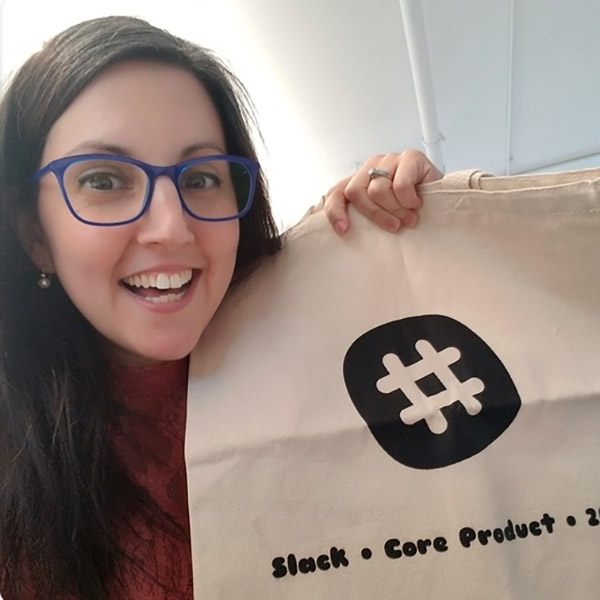Even under “normal” circumstances, working parents perform a balancing act between work and home life. Then the Covid-19 pandemic threw families an entirely different curveball. Parents who could work remotely recognized it was a privilege, but not without its challenges. Kids were suddenly home all the time. Masked outings were the new norm. Zoom calls? Potentially interrupted by screaming toddlers.
We spoke with a handful of Slack parents to hear about their experiences during the pandemic, and they candidly shared what they’ve learned and struggled with, how they’ve shown up for each other, and how they’re approaching the future. Even if things don’t get any easier, it became clear that we’re all in this together—and that a little humor goes a long way.

“While my other friends in the Bay Area were constantly worried about their jobs and getting laid off, we were encouraged to prioritize ourselves and our families, and take time off as and when we needed.”
Leadership normalizes the chaos of working from home with kids
When Slack offices went remote in early March, no one knew what was next. To set expectations, the higher-ups led the way. “Seeing our leaders as parents with their own balancing act created a safe space for the rest of us,” says Christine McHone, a senior customer success manager.

“Early during shelter-in-place, when chief marketing officer Julie Liegl’s daughters climbed on her lap during a company all-hands meeting, it set the tone for the support we’d receive.”
Ananya Helmich, a senior engineering manager, immediately felt supported. “My boss is an amazing mentor, friend, and mom of two herself,” she says. “Although her kids are older now, she understands and empathizes with every challenge that comes my way.”
During meetings, everyone makes it a point to check in on the home front. “We talk about how things are going outside of projects during every meeting,” says Helen Lee Kupp, the head of product strategy for the Future Forum. “That’s helped normalize these challenges.”

“From day one, my boss understood when my family needed me. I also have my kids in the background during team meetings: As a leader, it’s important to paint a realistic picture.”
New connections and challenges at home and work
With the freedom to be themselves, Slack parents can appreciate the unexpected connections the pandemic affords, both with their teams and families.
For Kupp, almost everyone on her team is a parent. “This means everyone understands when (1) you’re not camera-ready, (2) you have a baby emergency, and (3) you show up tired as hell because your baby’s not sleeping,” she says.
Ted Getten, a senior director of program management, is also grateful for an empathetic team, and enjoys seeing a different side of his colleagues’ lives. “I love when my teammates’ kids pop into meetings,” he says. “We’re all balancing our own challenges—and that’s OK. It’s made it easier to ask for help and offer help.”

“I am so grateful to be able to be close to my daughter and husband while also working at an incredible company, surrounded by inspiring colleagues that offer support and connection and challenge me to be better every day.”
Embracing unexpected moments and milestones at home
Like it or not, the pandemic forced everyone to spend more time with their household—and all the interruptions and moments of joy that come with it.
Getten says the distractions can sometimes be “gifts of time.” Recently, he was eating a sandwich while working when his two-year-old walked up and took a bite. “It was such a simple thing that helped me take a step back, close my laptop and share my sandwich,” he says. Since Slack set realistic expectations for just these kinds of moments, Getten felt comfortable seizing the moment. “The longer I’m home, the more balanced I’ve become.”
Helmich has a two-and-a-half-year-old and an eight-month-old, and appreciates how physically close she can be to both, especially her youngest. “I don’t have to struggle with postpartum feelings that come with leaving your baby behind as you head out to the ‘office,’ ” she says.
Recruiting coordination specialist Maggie Lindley felt a similar relief. In March, her maternity leave was set to end. “It tore my heart to pieces because I wanted to work but couldn’t bear the thought of being apart from her,” she says. Turns out, she never had to put her daughter in day care. “I’m just in the other room if she ever needs her mama,” she says. “My husband and I are splitting home and work life 50/50, and we’ve grown as partners.”
Ruth Baril, a product specialist, cherishes the unique time she got to spend with her daughter before college. “This has allowed us to get to know the early-adult version of her in ways most parents don’t usually get,” she says.

“In our old working world, my husband and I only had two hours a day to spend together. Now we get to eat lunch together every day, and I get to witness my four-year-old son grow and develop.”
Adapting to a new reality for everyone
Though they’re able to soak up more quality family time, Slack parents are constantly pivoting to address new challenges. “I’ve read about and noticed that we’re experiencing extended separation anxiety with my son,” Kupp says. “While babies typically ‘get over it’ at a certain age because their parents leave more often, he knows we’re still around. It’s heartbreaking when he’s crying so hard.”
Michael French, a customer success manager, welcomed his second child in June. “It’s sad to think she’s only ever seen the faces and smiles of her parents,” he says. “Everyone else she’s ever seen has had a mask on.”
Trisha Mitzelfelt, an organizational effectiveness partner, has a son in an isolated pod at school, where the stress and pressure of social distancing is constant. When a teacher in another pod tested positive for coronavirus, the pod shut down for 14 days, sending parents into a panic. “Having child care is essential for us to work, and we’re all afraid this might happen to our pod,” she says.
For parents with older kids, “typical” teenage moments are all but lost. “My oldest, and every other kid in the class of ’20 and ’21, has missed out on every major cultural milestone our society has been promising since early childhood,” Baril says.

“We each have our individual caregiving challenges, and we’ve all stepped up to help each other whenever needed, no matter the reason. This reciprocal support makes it easy to trust each other and take the time we need when we need it.”
Evolving work lives mean early mornings and late nights
Since it’s near impossible to keep kids on a schedule, let alone tell a baby when to sleep, Slack parents work around their families. “For any of the millions of things that have made working and parenting challenging this year, my boss has given (and re-given) me a blank check that says ‘Do what you need to do,’ no questions asked,” says French.

“Slack employees have always had empathy, and it’s only increased. That’s driven my empathy—not just toward other parents but toward those without kids and those balancing other caregiver responsibilities.”
Expectations constantly shift—for parents, their teams and managers—to accommodate the unpredictability of both children and the pandemic, and late nights are common. For French, it all hinges on day care. If it’s open, he has more time during the day to work. If it’s closed, “I’ll spend at least half my time caring for the kids, and there’s a 100% chance I’m logging back in at night.”
Hye Jung Choi, a senior software engineer, says she sneaks in work whenever she can. “My son’s nap time is the most precious window for me and my husband to get things done.”
To signal that she’s caring for her son, Mitzelfelt blocks her calendar and sets her Slack status to Do Not Disturb. “My manager has also been great about letting me take ETO (emergency time off), PTO and sick days,” she says.
Even with this kind of compassion, it can be hard to juggle everything. “Sometimes the baby wakes up insanely early, and instead of my usual routine, I’m responding to things one-off,” Kupp says. “It feels chaotic, and I always worry I may have missed something.”
Choi can relate. As an engineer, she would usually be part of an on-call rotation, but since going part-time with her child, her team removed her as a courtesy. “Though I’m sorry to burden others with more work, it’s been great not to have to worry about my 24/7 availability,” she says.
“Because I’m still nursing my baby, I have to take more breaks during the day for family stuff, like grocery shopping during non-busy hours, to minimize exposure. To catch up, I’m carving out time in my evenings to work.”
Community, support and distraction in Slack channels
At the heart of any Slack employee’s day are Slack channels, virtual spaces to share messages, workflow automations, digital tools and files. Among the parent-centric channels that were already active, many new ones popped up as the pandemic took shape.

The channels include:
#parentland, a place for parents to commiserate over being … parents#motherboard, a supportive space to share with and learn from other Slack moms#dad-jokesfor classic one-line zingers and dad-to-dad support#its-all-our-faultfor parents of tweens and teens#special-needs-parentsfor parents of kids with special needs#happy-placefor reliably smile-inducing memes and re-tweets#pregnancy-supportfor expecting and current moms
When someone joins #pregnancy-support, it’s understood that everyone keeps their news confidential until they’re ready to share more broadly. To expand on the popular channel (currently with more than 100 members), Lindley started a mindfulness program for moms at Slack to connect once a week.
“The program was a passion of mine, and I’m lucky to have had the freedom to make it happen at Slack,” she says. “I know this community of moms is going through similar things, which helps me feel supported and not alone.”
Often, social channels provide a way to stay connected without thinking too hard. “Having a place to totally zone out and read about #cooking, #baking, #beer and #texpats is great,’ ” French says. “#parentland does wonders for the blood pressure.”

“The community of Slack parents, and the openness (and hilarity) of what we’re going through has become critical to navigating life as a new parent, working remotely. I know I’m not in this alone.”
New life lessons and next steps
Slack parents have learned many things, including the importance of prioritizing themselves. “As a parent, you really need to take care of yourself before you can give anything to your job and family,” Price says. “If you don’t, you start to wear and break down.”
Looking ahead, some parents, like Choi, don’t plan on returning to the office. “My daily commute would be more than two hours, and I’d rather use that time to focus on work,” she says. Mitzelfelt agrees that she’d like to be remote with the option to visit the office. “I didn’t realize how much my commute took a toll on my body until I started working from home,” she says.
Others, like French, can’t wait to get out of the house. “I’m desperate to get back,” he says. “Maybe not five days a week, but 50% to 75% of the time.”
Overall, Slack employees recognize the balances, the challenges and the privilege of working from home. “I can’t stop being thankful for Slack, now more than ever,” Helmich says. “Our leadership has continuously urged us to take care of our mental health first and prioritize family over work. We truly live by the values we’ve committed to, and it’s not just for pomp and show.” [# /]






